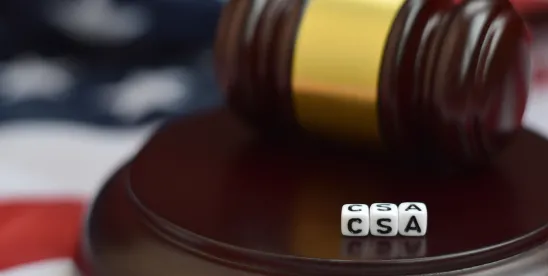Moving marijuana under the Controlled Substances Act (“CSA”) from Schedule I to Schedule III will bring celebrated changes to the beleaguered state-sanctioned cannabis industries currently operating in 37 states, but will result – without further changes – in those industries continuing to operate outside of compliance with federal law.
The Department of Justice Drug Enforcement Agency (DEA) noted as much when issuing its notice of proposed rulemaking (NRPM) on May 16, 2024. The good news is that the yoke of Internal Revenue Code 280E will be lifted from the shoulders of marijuana industry businesses disallowed by 280E from writing off otherwise allowable expenses and claiming tax deductions because of their trafficking in a Schedule I controlled substance. The less good news is that it appears, unless the Federal Food and Drug Administration approves marijuana as a prescription drug pursuant to the Federal Food, Drug, and Cosmetic Act (FD&C Act), that marijuana may not be lawfully dispensed as a Schedule III prescription drug nor be introduced or delivered for introduction into interstate commerce. The manufacture, distribution, dispensing, and possession of marijuana will remain subject to applicable criminal prohibitions of the CSA while remaining lawful pursuant to state regulatory programs, meaning participants in the marijuana industry will continue to operate in a gray area.
- Overview of the NPRM
On May 16, 2024, the DEA issued its NPRM to transfer marijuana from Schedule I to Schedule III of the Controlled Substances Act (CSA). Schedule I substances such as heroin, LSD, and ecstasy have a high potential for abuse, have no currently accepted medical use (CAMU), and lack information regarding accepted safety for use under medical supervision. Schedule III substances such as ketamine, codeine, and anabolic steroids have the potential for abuse less than substances in Schedules I or II,[1] a CAMU, and abuse of the substance may lead to moderate or low physical dependence or high psychological dependence.
The NPRM thoroughly evaluates the findings of the Department of Health and Human Services’ (HHS) August 2023 scientific and medical evaluation, which concluded that marijuana should be moved to Schedule III of the CSA. HHS conducted the required eight-factor analysis to determine the control or removal of marijuana from the CSA pursuant to 21 U.S.C. § 811(c):
- Its actual or relative potential for abuse.
- Scientific evidence of its pharmacological effect, if known.
- The state of current scientific knowledge regarding the drug or other substance.
- Its history and current pattern of abuse.
- The scope, duration, and significance of abuse.
- What risk, if any, is there to public health?
- Its psychic or physiological dependence liability.
- Whether the substance is an immediate precursor of a substance already controlled under this subchapter.
HHS then evaluated the appropriate schedule for marijuana pursuant to 21 U.S.C. § 812(b), finding 1) that marijuana has a potential for abuse less than the drugs or other substances in schedules I and II, 2) that marijuana has a CAMU, and 3) that the abuse of marijuana may lead to moderate or low physical dependence or high psychological dependence, making Schedule III the appropriate Schedule pursuant to which marijuana should be controlled.
The Attorney General (AG) acted on HHS’ recommendation via the NPRM. The AG had delegated scheduling authority to the DEA Administrator Anne Milgram, but the NPRM distinguishes that it is the AG, and not the DEA, who chose to exercise his authority to propose a rescheduling rule. The NPRM makes clear that it is soliciting additional data and information pursuant to the rulemaking process to enable the DEA to determine the appropriate schedule for marijuana. The DEA has not yet made up its mind. Further, per the Department of Justice’s Office of Legal Counsel (OLC) opinion, HHS’ findings are no longer binding on the DEA (though they will be accorded significant deference throughout the remainder of the rulemaking process). We are eager to see whether DEA concludes, as HHS and the AG have, that marijuana should be transferred to Schedule III.
- Key Takeaways
Litigation is inevitable following the dramatic shift in federal marijuana control signaled by rescheduling. One area seemingly ripe for litigation is HHS’ third, independent test created specifically to determine whether marijuana has a CAMU. HHS concluded that the DEA’s framework since 1992 for evaluating CAMU pursuant to a five-part test was inadequate when it came to determining the appropriate schedule for marijuana. The five-part test left no room to evaluate 1) the widespread use of marijuana under the supervision of a licensed healthcare practitioner under state-authorized programs or 2) whether credible scientific evidence supported such medical use. OLC agreed. HHS developed a third, independent test for evaluating CAMU along these lines and recommended a finding that marijuana has a CAMU.
Relatedly, the Farm Bill is due for renewal in September of this year. As most know, following the passage of the 2018 Farm Bill and its legalization of hemp contingent upon the percentage of delta-9 tetrahydrocannabinol (THC) in the product, a burgeoning $28 billion intoxicating hemp THC market has developed, seemingly outpacing the state-sanctioned marijuana industries because of the purported legality of the products as “hemp.” The intoxicating hemp THC market has developed in part around the extraction of intoxicating delta-8 and/or delta-10 THCs occurring naturally in small amounts in the cannabis plant. Manufacturers extract these naturally occurring, non-delta-9 tetrahydrocannabinols, manipulate them to magnify intoxicating effects, and sell these products as “legal hemp.” Such products may be referred to as synthetically derived THC, and have cropped up in gas stations, grocery stores, and elsewhere across the nation. DEA has made clear that synthetically derived THC falls outside the definition of marijuana under the CSA. An initial draft of the Farm Bill released on May 21 2024 purports to exclude hemp grown for cannabinoid extraction from the definition of “industrial hemp.” If, between marijuana rescheduling and a revised Farm Bill, intoxicating hemp THC falls squarely within Schedule I of the CSA, intoxicating hemp industry litigation is sure to follow.
[1] Schedule II substances include cocaine, methamphetamine, methadone, oxycodone, and fentanyl, among others.




 />i
/>i

